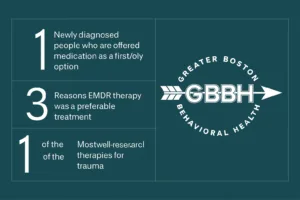I still remember sitting on the edge of that crinkly paper-covered exam chair while the psychiatrist scribbled something into a chart. I was expecting… I don’t know. Questions? Insight? Maybe a moment of connection? What I got was a prescription and a suggestion to “try it for a few weeks and see how you feel.”
It wasn’t wrong. But it didn’t feel right.
I’d finally asked for help—after weeks of panic attacks and months of quietly unraveling—but this next step felt like too much, too soon. I wasn’t anti-medication. I was scared. What if the meds dulled me? What if I lost my spark? What if getting better meant becoming someone I didn’t recognize?
I didn’t want to be numb. I wanted to be well.
And that’s when I heard about EMDR therapy.
When Medication Feels Like the Only Option—and That Option Feels Wrong
If you’re newly diagnosed and medication is the first (or only) thing offered, you’re not alone. It’s incredibly common for people to walk out of that first appointment clutching a bottle of something they’re afraid to take.
I remember thinking, “Is this really it? I open up about feeling unsafe in my own head and the answer is just… pills?”
Look—some people find medication transformative. And maybe I’ll revisit that path someday. But at that moment, I needed a version of help that felt like mine. Something that didn’t ask me to change who I was before I even understood what I was dealing with.
That’s what led me to EMDR therapy.
What EMDR Therapy Actually Is (And Isn’t)
Let’s get the formal part out of the way: EMDR stands for Eye Movement Desensitization and Reprocessing. It was originally developed to help people process trauma—but it’s since been used for a wide range of mental health struggles, including anxiety, panic, chronic stress, grief, and more.
Here’s the core idea: your brain knows how to heal. It just sometimes gets stuck replaying the same painful loop.
EMDR helps “unstick” that loop by using bilateral stimulation (like guided eye movements, taps, or sounds) while you bring up a memory, feeling, or negative belief. This helps your brain reprocess the experience and release its emotional charge—without having to rehash every painful detail.
It’s not hypnosis. It’s not a shortcut. And it’s not magic.
But for me, it felt like a door that had quietly been there all along.
What My EMDR Sessions Actually Looked Like
I expected something dramatic. What I got was calm, structured, and weirdly gentle.
We’d start with identifying a memory or body sensation that felt heavy. Then my therapist would guide me through bilateral stimulation—left-right eye movements, sounds in alternating ears, or taps on each hand.
At first, I thought, “This is too weird to work.” But as we kept going, something shifted.
One session, I started with a painful memory I thought I’d buried. Thirty minutes later, it felt… farther away. Not gone. Just less sharp. Like I could breathe around it instead of through clenched teeth.
EMDR didn’t erase my pain.
It let me reprocess it—so I could stop carrying it in the same old way.
Why I Chose EMDR Therapy Over Medication—At Least for Now
There were three reasons I knew EMDR therapy made sense for me:
- It respected my autonomy.
My therapist never pushed medication or promised instant results. She just offered options—and honored my pace. - It focused on the why behind the symptoms.
Instead of just managing panic attacks, we worked to understand where they were coming from—and how old wounds were still showing up. - It didn’t ask me to be anyone else.
I didn’t have to explain or justify my fear of losing myself. EMDR gave me space to work with my whole self—not just the symptoms.
That was powerful.
You’re Not Broken for Wanting an Alternative
We live in a world that often defaults to medication. And again—for some, it’s lifesaving. But if you’re newly diagnosed and medication scares you, that doesn’t mean you’re being difficult. It means you care about your mind, your identity, your agency.
And that’s worth protecting.
Whether you’re dealing with trauma, anxiety, obsessive thinking, or panic that hits you out of nowhere—EMDR therapy in Boston, MA is available. And it might be the right starting point for you, too.
Does It Work? What Research (and Real People) Say
EMDR is one of the most well-researched therapies for trauma. But beyond the data, here’s what I’ve seen:
- I sleep better.
- I react less explosively.
- I trust my emotions again.
- I don’t spiral as easily.
It didn’t “fix” me. It helped me stop treating myself like I was broken.
Therapists at places like Greater Boston Behavioral Health are trained in EMDR and trauma-informed approaches. You won’t be treated like a case file. You’ll be met with humanity, structure, and care.
Looking for EMDR Therapy Near You?
Whether you’re based in Boston or surrounding areas like Dedham or Needham, MA, it’s worth knowing your options.
You don’t have to commit to a full treatment plan on day one. You don’t have to explain every memory you’ve ever had. You just have to be open to trying something different—and seeing what comes up.
FAQs About EMDR Therapy for People New to Mental Health Treatment
Q: Is EMDR only for people with PTSD?
No. While it was originally developed for trauma, EMDR is now used to help people with anxiety, panic disorders, phobias, grief, and other mental health concerns.
Q: Do I have to talk about everything that happened to me?
Not in detail. One of the strengths of EMDR is that you don’t have to narrate every part of your trauma. Your therapist will guide you in a way that’s emotionally safe.
Q: Can I do EMDR and still decide about medication later?
Absolutely. EMDR doesn’t replace medication—but it can be an alternative or complement. You’re allowed to wait, explore, and make decisions at your own pace.
Q: How long does EMDR therapy take to work?
Some people notice changes in just a few sessions, while others need more time. It depends on your history, goals, and how comfortable you feel in the process.
Q: Is EMDR therapy available near me in Boston?
Yes. Greater Boston Behavioral Health offers EMDR therapy for a variety of mental health concerns. Whether you live in Boston, Dedham, or Needham, you can find local, trauma-informed care.
You Deserve a Path That Feels Right
Healing doesn’t always come in a bottle. Sometimes it comes in the form of safe connection, a gentle question, or a method that helps your brain lay down the burdens it’s been carrying for years.
If you’re scared of losing yourself to medication—or just not ready to go that route—you’re not wrong. You’re not broken. You’re being thoughtful.
And that deserves to be honored.
Call (888) 450-3097 to learn more about EMDR therapy in Boston, Massachusetts. Your pace is the right pace. Let’s begin there.


